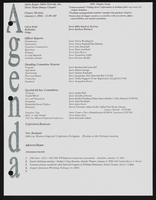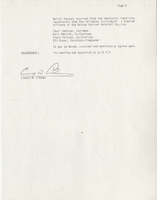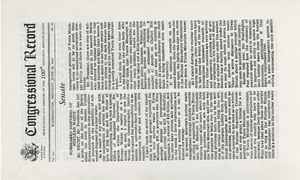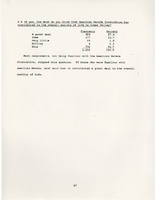Search the Special Collections and Archives Portal
Search Results

Alpha Kappa Alpha Sorority, Theta Theta Omega Chapter committee chairs and members list
Date
Archival Collection
Description
From the Alpha Kappa Alpha Sorority, Incorporated, Theta Theta Omega Chapter Records (MS-01014) -- Chapter records file.
Text

Elizabeth von Till and Claude N. Warren Professional Papers
Identifier
Abstract
The Elizabeth von Till and Claude N. Warren Professional Papers (1916-2021) are comprised of the personal and professional papers of anthropologist Claude N. Warren and historical preservationist Elizabth von Till Warren. The materials in this collection primarily consist of research files, maps, and drawings on various archaeological and historical preservation projects in southern Nevada of which they both were involved. This collection includes field notes and surveys from archaeological projects such as the Old Las Vegas Mormon Fort and the Las Vegas Springs Preserve. Records on von Till Warren's involvement with the Old Spanish Trail Association, Southern Nevada Historical Society, and historic preservation work around southern Nevada are represented. Also included are Robert H. Crabtree's archaeological research files, a colleague of Claude Warren who bequeathed his professional files to him upon his death.
Archival Collection

Jose Leonardo Martinez oral history interview: transcript
Date
Archival Collection
Description
Oral history interview with Jose Leonardo Martinez conducted by Barbara Tabach and Nathalie Martinez on August 19 and 29, 2020 for the Latinx Voices of Southern Nevada Oral History Project. Session 1: Jose discusses his childhood and what it was like growing up during the Salvadoran Civil War. He recounts the dangers he's faced and how he made his way to the United States after traveling through Guatemala and Mexico. Subjects discussed include: Salvadoran Civil War; Ciudad Arce, El Salvador; Guatemala; Mexico; Los Angeles, California. Session 2: Jose continues his discussion of growing up in El Salvador and the violence he witnessed in the country's army during the 1980s. He also talks about his personal life after moving to the United States and his experiences navigating gang culture in Los Angeles, California. Jose recounts his previous jobs, his schooling, how he met his wife, and his family's move to Las Vegas. Subjects discussed include: El Salvador army; gang violence.
Text

Transcript of interview with Joe Lappin by Gordon Brusso, March 4, 1976
Date
Archival Collection
Description
On March 4, 1976, Gordon Brusso interviewed former miner, Joe Lappin (born November 14th, 1914 in Santa Paula, California) about his life in Boulder City, Nevada. The two discuss his early occupational history and his work for the Bureau of Mines. He then goes on to explain the different housing systems that developed in Boulder City during World War Two.
Text

Transcript of interview with Mary & Bruce Eaton by Beatrice Scheild, March 8, 1975
Date
Archival Collection
Description
On March 8, 1975, Beatrice Scheid interviewed Mary and Bruce Eaton about their lives in Boulder City, Nevada. Mary first talks about her life in the early days of Boulder City, specifically the influences of the churches and schools. She also talks about housing, transportation, and her career as an educator. Bruce (born 1904 in Toronto, Kansas) also talks about his life in Boulder City and his arrival to Southern Nevada as he sought employment in working on the building of Hoover Dam. Bruce talks about his employment with Six Companies, Inc. and discusses topics such as the employment wages, his and Mary’s experiences in building a house, and their experiences in buying a house built by Six Companies. Bruce also talks about the roles of Sims Ely, the city manager of Boulder City, and Frank Crowe, the construction superintendent of Six Companies. Bruce then discusses the issues of worker’s compensation as it related to work on the dam, and he describes, in detail, the cooling system us
Text

Transcript of interview with Pamela Gale by Margaret Louis, July 10, 1995
Date
Description
Text

Transcript of interview with Flora Hannig-Kellar by Michael Taylor, March 27, 1981
Date
Archival Collection
Description
On March 27th, 1981, collector Michael D. Taylor interviewed housewife Flora Hannig-Kellar (born January 24th, 1902 in Washington, Utah) in Henderson, Nevada. This interview is Flora Hannig-Kellar’s personal account on growing up in Nevada. She discusses home and family life and local social and recreational activities. During the interview Mrs. Hannig-Kellar also shares some of the poetry she wrote about Nevada and her family, specifically her children and grandchildren.
Text


